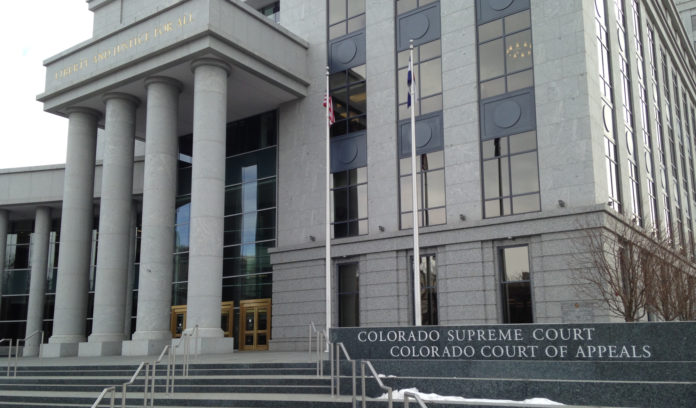

Editor’s Note: Law Week Colorado edits court opinion summaries for style and, when necessary, length.
The state of Colorado filed an interlocutory appeal seeking a review of the district court’s order suppressing inculpatory statements made by John Sanders Jr. The suppression order held Sanders’ statements were elicited during a custodial interrogation without proper warnings as required by Miranda v. Arizona, and the statements weren’t voluntary. Although the plaintiffs challenged the district court’s ruling as to custody, they failed to sufficiently challenge the court’s separate ruling as to voluntariness, the opinion noted. Because the district court’s latter ruling provided an independent basis for suppression and wasn’t challenged on appeal, the Colorado Supreme Court affirmed the district court’s order.
The state alleged Sanders repeatedly sexually assaulted his granddaughter between June 21, 2009, and Aug. 20, 2019. He was charged in Fremont County District Court with sexual assault on a child by one in a position of trust.
The police began investigating Sanders in 2020 after two of his granddaughters disclosed his alleged abuse. As part of that investigation, a detective identified in the opinion as Detective Smelser of the Cañon City Police Department traveled to Sanders’ residence in Great Bend, Kansas. The detective arrived at Sanders’ home on the morning of Sept. 25, 2020, where he spoke with Sanders’ wife. Detective Smelser let Sanders’ wife know he wanted to speak with Sanders, and she agreed to bring him with her to the Great Bend Police Station later that day so the two could speak.
Smelser’s conversation with Sanders took place in an interview room at the police station. The interview room was unlocked, and the detective told Sanders he wasn’t under arrest, wouldn’t be arrested that day and was free to leave at any time. At no point did Smelser read Sanders his Miranda rights, the opinion added.
Sanders later filed a motion to suppress his statements from the police station interview on Sept. 25, arguing the statements were obtained during custodial interrogation in violation of Miranda and weren’t made voluntarily.
Following a hearing on the motion, the district court agreed on both points and ordered the suppression of Sanders’ statements. In its written order, the court found Sanders had been subjected to two phases of questioning over approximately one hour and 40 minutes. During the first phase, he was compelled to provide circumstantial evidence of his guilt, and during the second phase, he was compelled to confess and prove to Smelser he was the “good kind” of offender, according to the opinion.
Building from these findings, the district court conducted separate legal analyses to determine whether Sanders was in custody for purposes of Miranda and whether his statements were voluntarily made. The court’s custody analysis considered the totality of the circumstances surrounding the interrogation and applied the custody factors listed in People v. Matheny. Following that analysis, the court concluded Sanders had been subjected to a custodial interrogation, requiring law enforcement to advise him of his Miranda rights. Next, the court examined the voluntariness of Sanders’ statements by listing seven factual findings relevant under People v. Gennings, including Smelser’s use of implied promises and arguably false evidence of Sanders’ guilt. The court concluded Sanders’ statements weren’t truly voluntary and had been effectively coerced by law enforcement.
The court ordered Sanders’ statements suppressed based on both the custody and voluntariness findings, concluding: “Not only should Mr. Sanders’[s] statements be suppressed because Mr. Sanders made them during a custodial interrogation without a valid Miranda advisement and waiver, they must be suppressed because the statements were not voluntary.”
The state sought interlocutory review. In its notice of appeal, the state characterized the sole issue to be raised as “[w]hether the district court err[ed] [sic] in finding that the Defendant was in custody during a knock-and-talk in his home.” Consistent with its notice of appeal, the state’s opening brief presented only one issue for review: “Whether the trial court erred in finding that the Defendant was in custody for purposes of Miranda during a voluntary interview at the Defendant’s local police station; and thus, whether the trial court erred in suppressing the Defendant’s statements.”
The state didn’t separately challenge the district court’s voluntariness ruling.
Because the state’s appeal failed to challenge the district court’s finding Sanders’ statements weren’t made voluntarily, the Colorado Supreme Court affirmed the district court’s suppression order.
Chief Justice Brian Boatright dissented.
Boatright noted he thought the state sufficiently contested voluntariness but agreed with the majority that the state sufficiently challenged the district court’s decision regarding custody.
“I believe we should have reached the merits of both the custody and voluntariness bases of the district court’s suppression order,” Boatright wrote. “In reviewing the suppression order, I conclude it should be reversed because Defendant John J. Sanders, Jr. was not in custody, nor were his statements involuntary.” Boatright wrote the statements that gave the trial court concern weren’t made until the last 10 minutes of the hour-and-a-half interview and Sanders didn’t make any inculpatory statements during those 10 minutes of concern. Boatright wrote he would reverse the district court’s order suppressing the statements.

